Showing 201–210 of 270 results
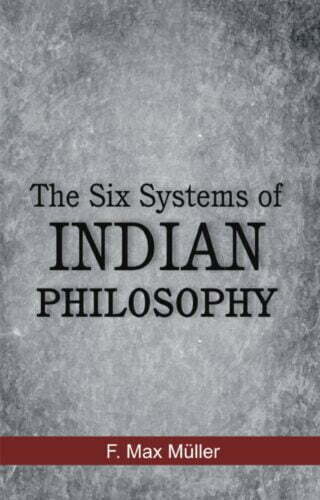
This volume addresses descriptively the key thoughts in Vedanta, Uttara-Mimamsa and Purva-Mimamsa, Samkhya, Yoga, Nyaya-Vaisheshika, and Vaisheshika systems. It reveals that Indian religion and the major philosophies of the land are well connected with the character of the inhabitants of India.
The Six Systems of Indian Philosophy by Friedrich Max Müller is a goldmine of comprehensive account of six major systems of Indian philosophical thought. It addresses descriptively the key thoughts in Vedanta, Uttara-Mimamsa and Purva-Mimamsa, Samkhya, Yoga, Nyaya-Vaisheshika, and Vaisheshika systems.
The book seriously focuses on one major finding that Indian religion and the major philosophies of the land are well connected with the character of the inhabitants of India. The originators of these six systems left no uncertainty as to the exact position which each of these philosophers occupied on the great battlefield of thought. Max Müller quite analytically approaches every system with full dedication and brings out the crux of all these thoughts. He revitalizes these systems and presents to the entire world the quintessentials of Indian thoughts.
This volume is also an effort to rejuvenate the lesser-known systems like Purva-Mimamsa, Nyaya, Vaisheshika and Yoga. This comprehensive volume should cater to the needs of all who operate in the domain of Indian philosophy.
“Dreams play a significant role in our life, meaningfully affecting us in the development of our personality and our spiritual journey. They are an everyday experience for any human being. Dreams have always been of great interest to poets and philosophers alike since ancient times and examples are aplenty in Indian and Western scriptures. However, it is an uphill task for an ordinary person to fully appreciate the intricacies and significance of dreams in the day-to-day life. It is here that this book proves as an invaluable guide providing deep understanding on the nature of dream and sleep.
This book is a repertoire of human wisdom – gathered for centuries and attested by the modern science – offering enormous insights into our dream and deep-sleep states. It asks, from a common man’s point of view, many a question that perturb us and provides answers to them from the scientific and spiritual perspectives in a captivating way. Some such questions include:
• Do we see dreams in black and white or in colour?
• What does a visually-challenged person see in his dreams?
• Why are some of our dreams extraordinarily vivid with electric colours, the clarity and brilliance of which, we may never encounter in our ordinary waking lives?
• Why are we non-reflective, irrational in our dreams?
• Are the dream time and waking time equal?
• How does our memory work in dream state? Why do we forget our dreams and is it possible to improve dream recall and cultivate awareness in dreams?
• Why do we fail to distinguish a dream object from the physical world object while we are dreaming?
• If the dream experience exactly feels like the real world and we fail to distinguish it from the waking world while we are dreaming, how can we be certain that we are not dreaming now?
• How does a dream contain various persons exhibiting opposite emotions at the same time when all the dream characters including the witnessing dreamer are produced out of single mind of the dreaming person?
• Can we intentionally transform the dream scenarios? If so, what would be the philosophical implications of it?
• Can dreams and sleeps be utilized for spiritual elevation?
… and many more questions we always wondered about the daily eight hours of our bed time, but never got the right answers to! We find new meanings and ways in dealing with our dreams in this volume, therefore, it is a must read for every dream enthusiast as well as any serious spiritual seeker.
“
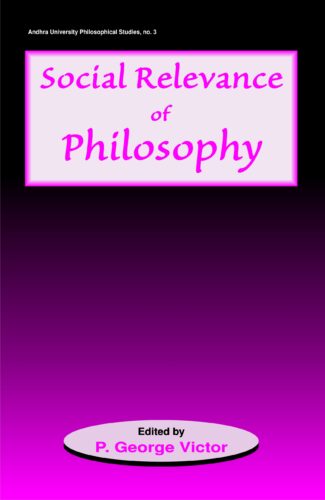
The essays study the relevance of philosophy at the social level, examining various philosophical systems. Considering the views of Indian and western thinkers including Thiruvalluvar and Gandhi, they take up contemporary concerns like dalit philosophy, philosophical counseling and tackling effects of consumerism.
What is the role of philosopher? Can philosophy be of any use to mans social living? These are some of the questions that the philosophy teachers try to answer in this book of twenty-two essays. It closely scrutinises the relevance of philosophy at the social level, throwing light on various philosophical systems and view of thinkers, both Indian and western. It shows how people can be guided on their many problems in a philosophical and holistic manner. Presented at a national seminar, the essays discuss a wide range of philosophical issues and perspectives on how man can modify his individual thinking, develop the spiritual dimension of life, transform his social conduct and manage personal and social relationships better. They deal with the relevance of Gandhis concept of freedom, the ethical importance of Tiruvalluvars philosophical outpourings, Buddhist perspectives on mindfulness and social reformation, and significance of Yoga for harmonious living. They take up contemporary concerns like reservations, dalit philosophy, growth of philosophical Counselling, ethical and bio-ethical dimensions of abortion, professional ethics, and role of philosophy in tackling the harmful effects of consumerism and materialism. This book will be extremely interesting for scholars of philosophy as well as general readers, and highly useful as a textbook in Applied Philosophy for students.
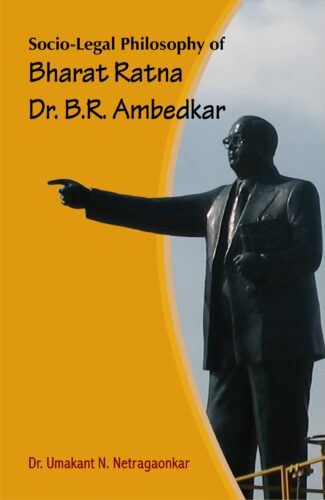
An in-depth study of Dr Babasaheb Ambedkar’s life, his social and economic philosophy, contribution to social justice, his struggle for rights of weaker sections in society, and his thoughts on the legal system of India, particularly human rights and equality of all peoples.
An in-depth study of the thoughts of Babasaheb Ambedkar on the social, economic and legal system of India, this book examines the relevance of Ambedkars thoughts today when societies have disparities and are going through conflicts. It deals with aspects of Ambedkars life, his social and economic philosophy, contribution to social justice, and his struggle for rights of weaker sections in society.
The volume deals with the social condition and political rule in the pre-Buddhist era and later till the sixth century ce, the origin and flourishing of the caste system in ancient times, and untouchability. It explores the meaning of some basic terms like justice. It views the Constitutional provisions regarding ensuring equality of all peoples and abolition of untouchability and explains how Ambedkar helped to establish the Constitutional rights of the SCs and the STs and the backward classes. A special focus is on the reservation issues and the judicial stand on them. It showcases the Supreme Court of Indias reinterpretation of Ambedkars vision and philosophy of social justice in its decisions concerning reservation. It throws light on the new concept of social justice that the judiciary has emphasized over the decades with stress on positive human rights.

The book makes it explicit on how certain important philosophical questions generated from logic are, in the ultimate analysis, rooted in the area of philosophy of language. It also suggests certain means of settling these issues of philosophy of logic.
Philosophy of logic and philosophy of language are closely interrelated areas of research. Many of the philosophical questions arising from logic cannot be fully addressed without taking into consideration certain issues associated with the concerned language. The philosophical issues, e.g. concerning validity of an argument, proof for the validity of an argument are philosophical problems, which are generated from the study of logic.
The book makes it explicit on how certain important philosophical questions generated from logic are, in the ultimate analysis, rooted in the area of philosophy of language. It also suggests certain means of settling these issues of philosophy of logic. In addition to certain issues in philosophy of logic the book extensively deals with certain issues in philosophy of language such as the issue concerning holism, semantic inferentialism, realism, objectivity of statements and representationalism.
Those who are engaged in advanced research in philosophy of language and philosophy of logic will benefit immensely from reading this book. It will also be of great use to the students of philosophy and to the general readers as well.

This volume encapsulates the advice of Krishna to Arjuna at the Mahabharata battlefield, through the poetic narration of Vedic seer Vasistha in Yoga-Vasistha, which is different from the traditional one found in Mahabharata. It melds together the wisdom of two great epics Bhagavad-Gita and Yoga-Vasistha providing unparalleled access to the great truths and insights of yoga and liberation.
Arjunas predicament of fighting and killing his own kinsmen and gurus in the Mahabharata War, and Lord Krishnas advice and thus the formers enlightenment are well known. Moving away from the traditional Mahabharata narration, Yoga-Vasishtha presents a different narrative approach by the Vedic seer, Vasishtha about the KrishnaArjuna dialogue to his pupil Rama as if it would happen eventually in the remote future.
While the Bhagavad-Gita accounts for Krishnas teaching of eighteen forms of yoga in 700 verses, Vasishtha narrates sixty stories in more than 28,000 verses, making Yoga-Vasishtha as one of the lengthier and most lyrical philosophical discourses in the world. In the course of the narrative, Vasishtha summarizes how to attain liberation, the essence of the Bhagavad-Gita, in seven chapters.
This lucid translation of Mokshopaya, a section of the Yoga-Vasishtha, encapsulates the message of Krishna, through the poetic narration of Vasishtha. Arjuna experiences the dissolution of his ignorance, overcomes his attachments and arrives at a point of freedom. The author, by choosing to highlight the story of Arjuna from two sources, has melded together the wisdom of two great epics Bhagavad-Gita and Yoga-Vasishtha providing the reader with unparalleled access to the great truths and insights of yoga and liberation.
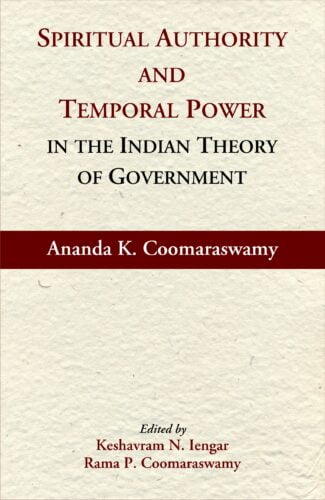
This collection of A.K. Coomaraswamy’s writings expounds the Indian theory of government based on textual sources such as the Brahmanas and the Rigveda. It vividly talks about the relationship between the spiritual and temporal power, paving the way for community welfare.
A literary work built up with parallel citations is apt to grow in the compass of the author himself, from his encyclopaedic scholarship. This revised edition of one of Coomaraswamy’s most significant writings is now being issued by incorporating his own additions to the printed first edition of 1942.
The Indian theory of government is expounded on the basis of the textual sources, mainly of the Brahmanas and the Rigveda. The mantra in the Aitareya Brahmana VIII.27, by which the priest addresses the king, spells out the relation between the spiritual and the temporal power. This ßmarriage formulaû has its analogous applications in the cosmic, political, family and individual spheres of operation, in each by the conjunction of complementary agencies.
The welfare of the community in each case depends upon a succession of obediences and loyalties; that of the subjects to the dual control of king and priest, that of the king to the priest, and that of all to the principle of an External Law (dharma) as king of kings. The king is such by Divine Right, but by no means, an absolute monarch. He may do only what is correct under the Law. Self-control is the sine qua non for the successful government of others; the primary victory is that of the Inner Man.
The application is to the king’, the man of action’ and artist’ in any domain whatever. There is nothing that can be truly and well done or made except by the man in whom the marriage of the Sacerdotium (brahma) and the Regnum (ksatra) has been consummated, nor can any peace be made except by those who have made their peace with themselves.
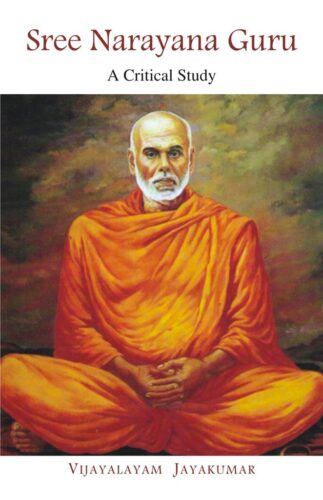
The book reconstructs the life of the legendary saint-reformer, Sree Narayana Guru and the entire scenario of his activity covering a century of Keralas history. It focuses on his life, historical background, socio-cultural milieu, spirituality, etc.
It is a holistic, at once compelling account of a saint-reformer of modern Kerala: Sree Narayana Guru (1856-1928). Veritably a versatile genius: a sage, philosopher, poet and social revolutionary, all rolled into one, Gurudeva was a perfect, though largely inscrutable, human being who, like Svami Ramakrishna Paramahamsa, created new tracts of his own in the realms of Indian philosophy. And invested temporal life, in any form, with an air of spirituality about him as is reflected, for instance, in his crusades against caste discriminations in Kerala or in his larger concerns with peace, universal brother-hood and co-existence. Dr. Jayakumars profile of this great guru focusses on his life, historical background, socio-cultural milieu, spirituality, philosophy, poetic genius, social reforms, humour, legacy and all else that one would possibly want to know about Sree Narayana Guru. Markedly different from the sofar-published studies on him, this book becomes the first ever to incorporate the English versions of Narayana Gurus verses: in both Malayalam and Sanskrit, together with their streamlined annota-tions and lucidly-written, insightful discussions. Which, in turn, also bring out Jayakumars remarkable critical acumen in highlighting the essential meaning, philosophical import and spiritual intensity of Gurudevas poetry. A work of epical grandeur, developed from years of the authors serious, persevered research, the book reconstructs not just the life-story of a legendary saint, but also the entire scenario of his activity covering over a century of Keralas social, spiritual and literary history.
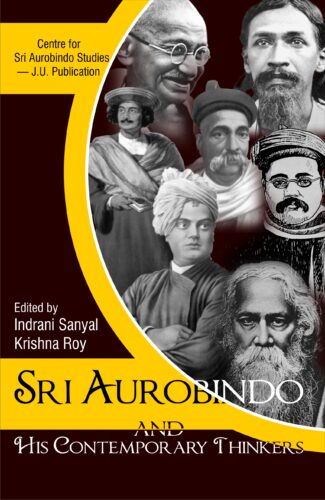
The book studies the contributions of some of the illustrious persons like Rammohan Roy, Gandhi, Tagore, Gokhale and Satish Chandra to the socio-cultural and spiritual life of late eighteenth to nineteenth century, and aims at situating Sri Aurobindo’s thoughts vis- -vis those of his contemporaries.
The period spanning the latter half of the eighteenth century and the nineteenth century in India was marked by a reawakened national spirit to reinterpret Indian traditional values in modern light. This book, comprising deliberations presented at a national seminar, discusses some of the illustrious persons of that period who by their ideas and actions enriched the socio-cultural and spiritual life of the period. Researchers study the period of Sri Aurobindo, his contributions as well as those of his contemporaries including Raja Rammohan Roy, Mahatma Gandhi, Tagore, Gokhale and Satish Chandra. The aim is to situate Sri Aurobindo’s thoughts in its socio-cultural background and study the contributions of his contemporaries to bring out the distinctiveness of Sri Aurobindo. The essays deal with Sri Aurobindo’s philosophy of nationalism, his view of Indian renaissance and Ireland’s national and cultural renaissance and his attitude towards national education. They take up interpretations of violence and non-violence by Sri Aurobindo and Mahatma Gandhi, Vivekananda’s outlook about morality, caste system and dharma, and response of Aurobindo, Tilak and Gokhale to Western imperialism. An interesting effort is made to compare the thoughts of Sri Aurobindo and Tagore towards the revolutionary movement and reveal Aurobindo’s perception of Tagore’s poetry. The book will be useful to historians, political and social thinkers, besides the general readers.
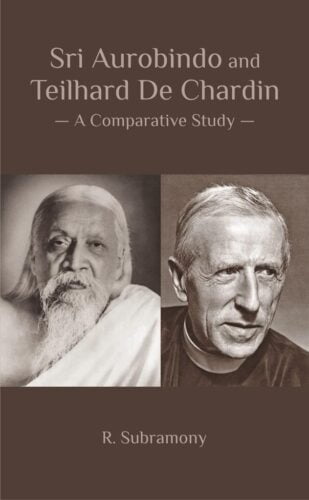
The book critically analyses many philosophical concerns of both Sri Aurobindo and Teilhard de Chardin and talks about the future evolution. It involves recognizing parallel features as well as differences in both the philosophers.
Sri Aurobindo and Teilhard de Chardin: A Comparative Study ventures into identify the progressive rungs in the ladder of human consciousness pointed out by both the thinkers, to see how they visualize going beyond to achieve Sachchidanda, the Supreme Bliss. The scrutiny involves recognizing parallel features as well as differences in both the philosophers.
Their writings are extremely significant in a phase where the future of humanity is at risk. Sri Aurobindo, who is steeped in the Vedic wisdom of the ancient India, calls up on us to shed our selfish nature and reach the higher levels of consciousness. Teilhard de Chardin, a Jesuit priest, exhorts us to unite and shed divisions. There is a striking similarity in their cosmologies. Sri Aurobindos concept of Supermind is the last stage in evolution and Teilhards Omega Point is the summit of evolution. Their process of evolution contains a triple transformation of consciousness. The book critically thus analyses many philosophical concerns of both Sri Aurobindo and de Chardin and talks about the future evolution.
| There are no products |